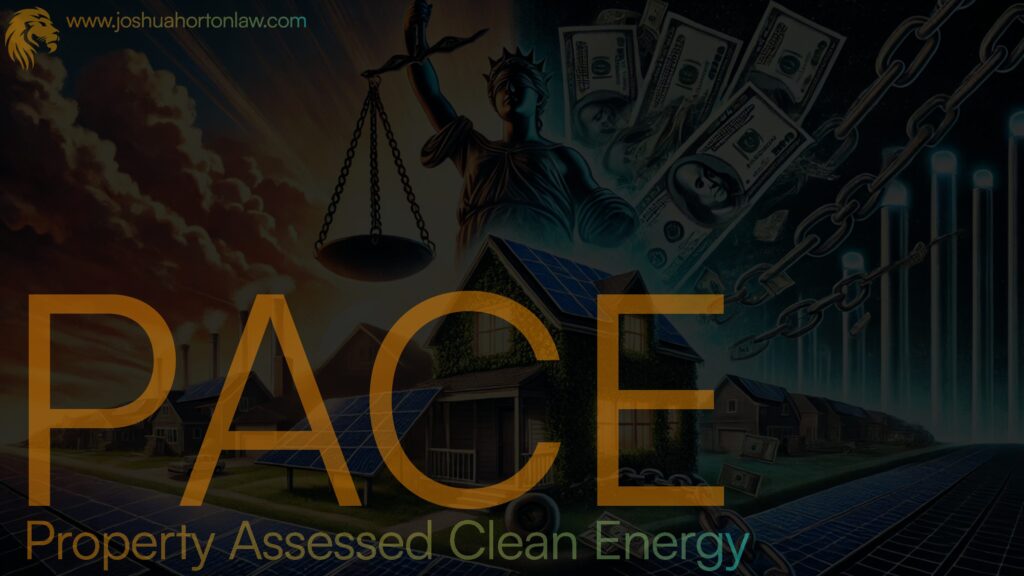Solar Panel Fraud and the PACE Program

In the state of Florida, where sunshine should symbolize opportunity and renewal, an ominous shadow looms over the rights of homeowners. The Property Assessed Clean Energy (PACE) program, ostensibly designed to advance sustainable energy, has mutated into a predatory machine. This program, governed by Fla. Stat. § 197.3632, presents itself as a gateway to energy efficiency and environmental stewardship. Instead, it exploits unsuspecting homeowners, subjecting them to deceptive terms, crushing financial burdens, and the outright erosion of their constitutional rights.
PACE financing is not just a policy failure—it is a constitutional crisis. It undermines fundamental principles of due process, access to justice, and the right to petition the government for redress of grievances. This is not merely a failure of governance but a betrayal of the democratic ideals enshrined in our Constitution.
The Constitutional Erosion of Due Process
The Constitution guarantees that no individual shall be deprived of life, liberty, or property without due process of law. This promise, articulated in the 14th Amendment and echoed in Article I, Section 9 of the Florida Constitution, is the bedrock of our legal system. Yet PACE agreements flagrantly violate these principles, stripping homeowners of procedural protections in ways that should shock the conscience of any jurist or legislator.
PACE agreements, by design, circumvent the basic tenets of procedural due process. Homeowners are often coerced into waiving their right to a public hearing, denying them the opportunity to voice objections to the imposition of non-ad valorem assessments. This waiver is buried in fine print, presented as a non-negotiable term, and executed without meaningful explanation or informed consent. These agreements sideline the procedural safeguards that should precede the creation of a lien that supersedes even the mortgage—a move that irreversibly alters property rights and burdens homeowners with potentially ruinous financial obligations.
In Fuentes v. Shevin, 407 U.S. 67 (1972), the U.S. Supreme Court affirmed that procedural due process requires notice and an opportunity to be heard before a significant deprivation of property. PACE agreements defy this precedent, treating the statutory imposition of assessments as a foregone conclusion rather than a process requiring homeowner participation and consent. This denial of due process is not merely unconstitutional; it is antithetical to the very notion of fairness.

The Attack on Substantive Rights
PACE financing does more than erode procedural due process—it also implicates substantive due process, which protects individuals from arbitrary or capricious government action that infringes upon fundamental rights. By prioritizing PACE liens over existing mortgages, the program disrupts the traditional hierarchy of property rights, jeopardizing homeowners’ ability to refinance or sell their property. This super-priority lien status, authorized by Fla. Stat. § 197.3632, imposes an undue burden on homeowners while conferring extraordinary benefits on financiers and contractors.
The doctrine of substantive due process requires that laws serve a legitimate public purpose and do so in a manner proportionate to the harm inflicted. While the stated goal of PACE—encouraging energy efficiency—is laudable, its implementation fails this test. The imposition of liens without meaningful consent, the exorbitant costs concealed within financing agreements, and the lack of oversight all reveal a program designed not to serve public welfare but to enrich private entities. The burdens placed on homeowners are neither rational nor justified, rendering the statute ripe for constitutional challenge.
The Right to Petition and the Unconscionable Waivers
Embedded within the First Amendment to the U.S. Constitution is the right to petition the government for redress of grievances—a right echoed in Article I, Section 5 of the Florida Constitution. This foundational principle ensures that individuals may seek remedies for injustices, whether through public hearings, administrative processes, or the courts. Yet PACE agreements extinguish this right with sweeping waivers that preclude homeowners from challenging the terms of their contracts in any meaningful forum.
These waivers are an affront to constitutional norms. The U.S. Supreme Court has consistently held that contractual provisions cannot extinguish fundamental rights. For instance, in Shelley v. Kraemer, 334 U.S. 1 (1948), the Court invalidated private agreements that undermined constitutional protections, emphasizing that private actions are subject to constitutional scrutiny when they rely on government enforcement mechanisms. Here, PACE waivers, enforced through statutory liens and tax collection procedures, amount to state action that extinguishes core constitutional rights. They cannot withstand judicial scrutiny under any standard of review.
Unconscionability and Public Policy
Florida contract law reinforces the constitutional arguments against PACE agreements. Under the doctrine of unconscionability, a contract is unenforceable when it results from unequal bargaining power and imposes terms that are oppressive or unfair. PACE agreements meet both criteria. Procedural unconscionability arises from the lack of transparency, the coercive nature of the waivers, and the inability of homeowners to negotiate terms. Substantive unconscionability is evident in the egregious financial terms, including inflated costs, hidden fees, and the super-priority lien status that jeopardizes property ownership.
These agreements also violate public policy. Courts have long held that contracts contrary to public policy are void. By denying homeowners access to public hearings and judicial remedies, PACE agreements subvert the public interest in transparency, fairness, and accountability. They transform a well-intentioned environmental initiative into a predatory scheme that undermines the rule of law.
A Blueprint for Reform and Accountability
The path forward requires a two-pronged approach: constitutional litigation and legislative reform. On the litigation front, homeowners and their advocates must challenge PACE agreements and Fla. Stat. § 197.3632 on due process and First Amendment grounds. Facial and as-applied challenges can expose the statute’s deficiencies, and claims rooted in unconscionability can provide immediate relief to affected homeowners.
Legislative reform must address the systemic issues that enable predatory practices. Lawmakers should amend the statute to require robust disclosure requirements, eliminate waivers of constitutional rights, and impose strict oversight on contractors and financiers. Public hearings should be mandatory for all non-ad valorem assessments, and homeowners must retain the ability to contest these assessments in court.
Finally, the broader vision of PACE financing must be realigned with its original purpose: to promote sustainability and energy efficiency in a manner that uplifts, rather than exploits, communities. This requires transparency, accountability, and a commitment to placing the public good above private profit.
Conclusion: Defending Constitutional Principles
PACE financing is not just an issue of consumer protection—it is a test of our commitment to constitutional principles. It asks whether we will allow the rights of homeowners to be trampled by corporate greed and bureaucratic negligence or whether we will rise to defend the ideals enshrined in our Constitution. The fight against PACE is a fight for due process, for access to justice, and for the fundamental dignity of every American homeowner.
This is not a battle we can afford to lose. It is a call to action for lawyers, legislators, and citizens alike to demand accountability, challenge injustice, and ensure that no one is above the law. Together, we can dismantle this predatory system, restore constitutional protections, and build a future where sustainability and justice go hand in hand. Let us begin this fight, not out of anger, but out of an unyielding commitment to fairness and the rule of law.
